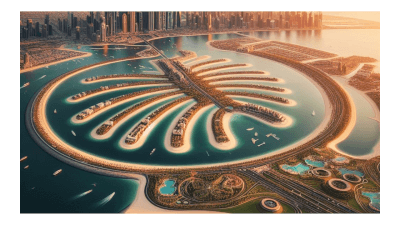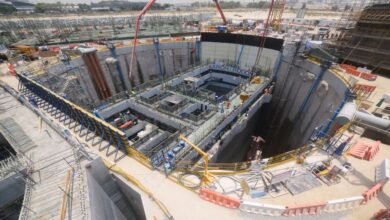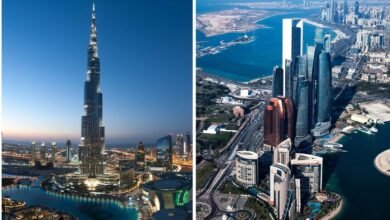
The Dubai Economic Agenda: Transforming the Real Estate Sector
Dubai, the visionary city in the United Arab Emirates, has been recognized globally for its remarkable achievements in urban development. The driving force behind Dubai’s transformation is HH Sheikh Mohammed bin Rashid Al Maktoum, whose clear vision has propelled the city to unimaginable heights. One of his latest initiatives, the Dubai Economic Agenda (D33), aims to revolutionize every sector, including the real estate market. In this article, we will explore the key objectives of D33 and its impact on the real estate sector in Dubai.
Dubai Economic Agenda: A Vision for Growth
Launched on January 4, 2023, by HH Sheikh Mohammed bin Rashid Al Maktoum, the Dubai Economic Agenda (D33) is a groundbreaking project that focuses on partnerships, investment, technology, digitization, and people empowerment. The primary goal of D33 is to double the size of Dubai’s economy over the next ten years, positioning the city among the top three global cities. This ambitious agenda will transform Dubai into a leading destination for global investors and businesses.
Key Objectives of D33
D33 encompasses a wide range of objectives that are set to shape Dubai’s economic landscape for the next decade. The agenda aims to increase foreign trade, attract foreign direct investment (FDI), boost government spending, encourage private sector investments, and enhance the value of domestic demand for goods and services. Additionally, D33 places a significant emphasis on digital transformation projects, aiming to generate an annual contribution of AED 100 billion to Dubai’s economy.
Here are the key objectives of D33 for the next 10 years:
- Increase Foreign Trade: D33 aims to elevate Dubai’s foreign trade from AED 14.2 trillion in the past decade to AED 25.6 trillion for goods and services in the next decade. This ambitious target will further solidify Dubai’s position as a global trading hub.
- Attract Foreign Direct Investment: The agenda seeks to increase FDI from an average of AED 32 billion annually to an average of AED 60 billion annually, reaching a total of AED 650 billion by 2033. This influx of investments will contribute to Dubai’s economic growth and development.
- Boost Government Expenditures: D33 aims to increase government expenditures from AED 512 billion to AED 700 billion. This increase in spending will support various sectors, including infrastructure development, healthcare, education, and innovation.
- Encourage Private Sector Investments: The agenda targets an increase in private sector investments from AED 790 billion in the past decade to AED 1 trillion in the next decade. This focus on private sector growth will create new opportunities for businesses and drive economic prosperity.
- Enhance Domestic Demand: D33 aims to increase the value of domestic demand for goods and services from AED 2.2 trillion to AED 3 trillion in the next decade. This increase in consumption will stimulate economic activity and further strengthen Dubai’s economy.
D33 Roadmap: Transforming Dubai’s Real Estate Sector
Dubai’s ability to design and implement infrastructure and industry development projects has been instrumental in its economic growth. D33 is no exception, as it includes 100 transformational projects across various sectors, including the real estate market. Let’s explore how D33 will positively impact the real estate sector in Dubai:
1. Increased Demand for Office Space
As D33 focuses on significant investments in Dubai’s infrastructure, more corporations from across the globe will be attracted to establish their operations in the city. This influx of businesses will create a higher demand for office space, benefiting the commercial real estate sector.
2. Surge in the Demand for Premium Properties
D33 places a strong emphasis on attracting foreign investments in technology, entrepreneurship, and innovation. This strategic focus will result in an influx of high-net-worth individuals (HNWIs) moving to Dubai for business purposes. As a result, there will be a surge in demand for premium properties, such as villas and luxury apartments, driving the sales of high-end real estate.
3. Development of Innovative Projects
D33’s agenda prioritizes investments in innovative technologies, leading to the development of revolutionary real estate projects. These projects will include smart homes, green buildings, and sustainable communities, making the real estate sector more attractive to local and global investors. The integration of innovative technologies will enhance the resident experience and improve the quality of life in Dubai.
4. Foster Competition and Mixed-Use Projects
With the focus on developing innovative real estate, D33 will promote healthy competition among real estate developers. This competition will drive the creation of more unique and mixed residential and commercial projects that align with the evolving demands of buyers. Furthermore, D33 emphasizes a scale-up program for small and medium enterprises (SMEs), identifying high-potential companies and supporting their capacity building. This will create additional demand for modern office spaces, attracting companies and individuals seeking new opportunities in line with the D33 vision.
In conclusion, the Dubai Economic Agenda (D33) is a transformative initiative that aims to position Dubai as a global financial hub. The agenda’s comprehensive objectives, including increasing foreign trade, attracting investments, boosting government spending, and enhancing domestic demand, will have a profound impact on the real estate sector in Dubai. With increased demand for office spaces, a surge in premium property sales, the development of innovative projects, and the promotion of healthy competition, the real estate market in Dubai is set to flourish in the next decade. D33 will shape the future of Dubai’s real estate sector, further solidifying the city’s reputation as a premier global destination for investors and businesses.






